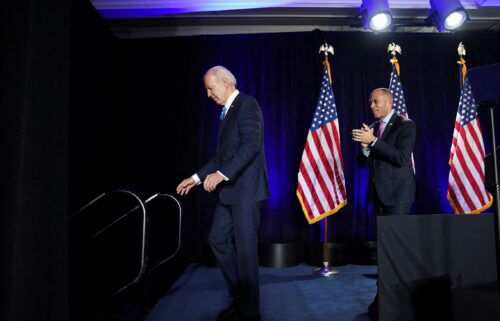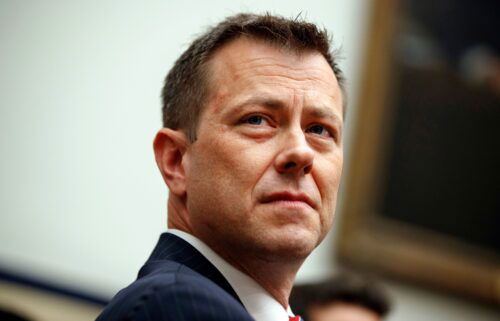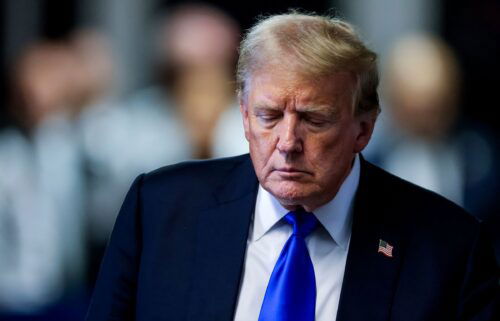5 times Capitol Hill testimony left its mark on the Trump presidency

A new public phase of the impeachment inquiry kicks off Wednesday with public testimony from career State Department officials.
Democrats hope the effort builds public support for impeachment in the House, which they are pursuing even though it currently seems unlikely President Donald Trump will be removed from office by a trial in the Senate.
Bill Taylor, the top US official currently serving in Ukraine, will talk about Trump’s alleged efforts to pressure Ukraine into investigating his political rivals and George Kent, who oversees Eurasia policy from DC, will outline how Trump’s personal attorney conducted a campaign to undermine his ambassador to Ukraine.
The prospect of public impeachment hearings featuring civil servants critical of his leadership will be uncomfortable, but angry testimony from current or former federal workers is not something entirely new for Trump.
Republican senators have largely shielded him from critical hearings and Democrats have only held control of the House since January.
Michael Cohen: Attorney turns on client
Cohen was more a fixer for Trump than an attorney. And his accusations against his former boss went well beyond the normal attorney-client relationship. On his way to jail for tax evasion, Cohen let loose in public about the misdeeds he said his boss pushed him into, like payoffs to women who alleged affairs, inflating the size of Trump’s wealth and more.
He called his former boss a “racist” and a “conman.”
As CNN’s Jeremy Herb documented back in February, Cohen claimed Roger Stone told Trump that he has spoken to WikiLeaks founder Julian Assange and there would be an email leak forthcoming in 2016 and he laid out why he thought Trump knew in advance that his son and son-in-law were meeting with Russians promising dirt on Hillary Clinton.
That a former trusted ally turned on his boss was a remarkable thing to witness. That the boss was the sitting President of the United States was unprecedented in US history.
James Comey #1: The Russia investigation must go on
Trump was barely three months into office when FBI Director James Comey went to Capitol Hill to tell the truth. Trump was not pleased.
Comey confirmed in public that throughout the heat of 2016, the FBI was also investigating possible ties between Russia and the Trump campaign. He reiterated the belief of the entire US government except Trump that Russia interfered in the 2016 election.
He also completely denied Trump’s assertion that the Obama campaign had spied on him.
Trump tweeted obliquely about Comey’s testimony in real time and, when Comey was read the tweets, he refuted them. It was an odd spectacle with the President and his FBI Director communicating via Twitter and public testimony. It wasn’t the last time Comey testimony would rankle Trump.
James Comey #2: Fear the FBI Director scorned
Trump’s firing of Comey was a key moment in his presidency as he tried to squash the Russia investigation.
Comey went to Capitol Hill a month later and returned the favor. Comey described what he considered Trump’s inappropriate pressure on him to drop the investigation, he talked about his efforts to navigate the mercurial President’s demands and he answered Trump’s denials of his accusations by declaring he hoped Trump had in fact recorded their conversations.
“Lordy, I hope there are tapes,” he said, answering a Trump tweet that Comey should be afraid that recordings existed. Comey consulted notes he kept of their meetings.
The former FBI director was reviled by Democrats because he played such an important role in Trump’s election. He gave testimony critical of Hillary Clinton’s handling of classified data in 2016 and then, at the last minute, the FBI announced a new review of her emails. Clinton lost for a lot of reasons, surely. And Comey was one of them. He said that idea made him “mildly nauseous.”
But then he showed himself to be not on any one political side when he lashed out at Trump, repeatedly calling the President out for lies.
And it’s also worth noting the fiery testimony of former FBI agent Peter Strzok here.
He is a former member of the Russia investigation, he clashed with House Republicans about text messages critical of Trump he exchanged with a fellow government worker with whom he was having an affair.
Brett Kavanaugh’s Supreme Court confirmation: He said, she said
Republicans had to hold confirmation hearings for Trump’s two Supreme Court nominees, and while Republicans ultimately closed ranks around Brett Kavanaugh, the hearings featuring Christine Blasey Ford’s public accusation of sexual assault when the two were in high school was one of the most intense and polarizing moments of public testimony in recent American history.
She was a compelling and believable witness who said she was 100% sure he assaulted her. He was defiant and angry at the accusation, which he completely denied.
Those hearings didn’t directly feature Trump, but his support for Kavanaugh through controversy helped propel the justice onto the Supreme Court.
The Mueller report: testimony under pressure
Other notable hearings of the Trump era have focused directly on Trump. Robert Mueller, the former FBI director who served as a special counsel to run the investigation into Russian election interference made clear he did not want to publicly testify about the report he spent more than a year writing.
Rather, Mueller said the written report was his testimony. But its release had been slowed by Attorney General William Barr, who also insisted that Mueller follow the Justice Department policy that a sitting president cannot be indicted.
Barr initially published only his very spare takeaways from Mueller’s report, which was that he could not indisputably prove collusion between Trump’s campaign and Russians and that he was not recommending prosecution of Trump. The fuller report was much more damning and outlined many interactions between Trump’s aides and Russians and also documented multiple examples of possible obstruction of justice.
Democrats hoped to highlight those elements with Mueller. But his sedate delivery had Trump claiming vindication after Democrats ultimately got him to the witness table with a subpoena. A day later, Trump pressured Ukraine President Volodymyr Zelensky to investigate the Bidens, inviting new allegations of collusion with a foreign power.



